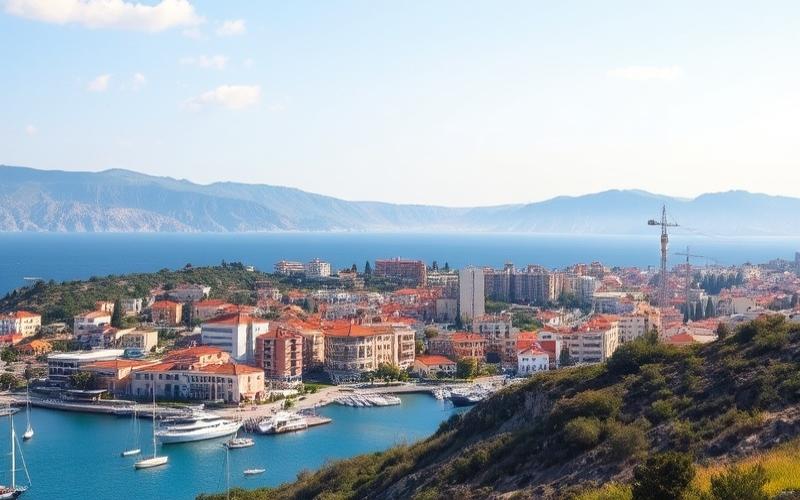
 Published on and written by Cyril Jarnias
Published on and written by Cyril Jarnias
Cyprus, a Strategic Destination for Industrial Establishment
Cyprus, a true bridge between Europe, Africa, and Asia, is establishing itself as a strategic destination for industrial establishment thanks to its booming free zones.
With favorable taxation and prime geographical locations, the island offers remarkable investment opportunities for businesses seeking new frontiers of growth.
The modern infrastructure and exceptional connectivity with major regional markets allow Cyprus to position itself as a vibrant and dynamic logistics hub.
Discover how these free zones are becoming essential catalysts for ambitious investors looking to leverage the flourishing economic potential of this Mediterranean island.
Good to Know:
Cyprus’ free zones offer specific tax benefits and simplified customs procedures for exporting companies.
Investing in Logistics Warehouses in Cyprus
Cyprus benefits from a strategic geographical position at the crossroads of Europe, Asia, and Africa, making it a natural hub for logistics and regional trade. This situation allows businesses established on the island to quickly access diverse markets, thereby strengthening their international competitiveness.
Cyprus’ port and airport infrastructure is particularly developed to support global trade. The country has four major ports, including those in Limassol and Larnaca, which play a central role in goods transit. The Port of Limassol is recognized for its ability to accommodate the largest vessels thanks to its modern facilities and depths suitable for container ships. Constant investments ensure optimal performance: for example, a new modern passenger terminal will soon be operational there. On the air side, the international airports of Larnaca and Paphos are also undergoing significant expansions to support the growth of both passenger traffic and air freight. These works include creating additional commercial spaces and enhancing logistics capabilities.
Cyprus also offers attractive tax incentives through its free zones located around the main ports. These schemes not only facilitate tax domiciliation but also offer regulatory benefits such as administrative simplification for foreign investors looking to operate or develop logistics warehouses.
The Cypriot industrial real estate market is currently experiencing sustained momentum, driven by the increasing digitalization of international trade and particularly by the rise of e-commerce. Demand for modern storage spaces is increasing significantly; this trend is illustrated by a high occupancy rate in industrial areas near strategic ports.
| Asset | Description |
|---|---|
| Geographical Position | Europe-Asia-Africa Crossroads |
| Port Infrastructure | Deep Ports (Limassol/Larnaca), Modern Equipment |
| Airport Infrastructure | Major Extensions (Larnaca/Paphos) |
| Tax Incentives | Free Zones Favorable to Investments |
| Real Estate Demand | Strong Growth Linked to E-commerce |
Potential profitability remains high thanks to several factors:
- An attractive rental yield due to the relative scarcity of premium industrial space.
- Strong prospects with a continuous annual increase in volume handled at maritime hubs.
- Several recent projects already demonstrate local success: rapid development around the Port of Limassol with near-full occupancy in certain specialized segments (e.g., cold storage warehouses or those dedicated to transshipment).
- Statistics show that the logistics sector now represents a notable share of commercial real estate transactions on the island.
Key recommendations for effective investment:
- Prioritize analyzing locations near major ports or highway arteries.
- Favor new or renovated assets meeting international standards (fire safety, truck accessibility, etc.).
- Rely on a local expert partner both to navigate the regulatory framework and to quickly identify emerging opportunities.
In summary, Cyprus combines a unique strategic position, efficient infrastructure, advantageous tax incentives, and strong sectoral dynamics—all assets that make its industrial logistics market a very attractive option for any investor wishing to establish a lasting position in this segment in the Eastern Mediterranean.
Good to Know:
Cyprus positions itself as an ideal logistics hub thanks to its strategic geographical location, linking Europe, Asia, and Africa. Its modern port and airport infrastructure greatly facilitate international trade. Additionally, Cypriot free zones offer advantageous tax incentives to attract foreign investors. The industrial real estate market in Cyprus is booming, driven by increased demand for storage space, stimulated by the growth of e-commerce. Profitability prospects are promising, with several recent projects demonstrating strong growth potential. Potential investors should consider local partnerships to leverage incentives and navigate local regulations.
The Best Free Zones for Industrial Real Estate
Cyprus has several strategic free zones that offer a privileged framework for the establishment of industrial businesses and real estate investment. These zones constitute major attraction hubs for international investors seeking to establish themselves in a favorable environment.
The main free zones in Cyprus are located in Larnaca and Limassol, two coastal cities offering considerable advantages for industrial real estate. These zones benefit from significant customs and tax advantages, making investment particularly attractive.
The Larnaca Industrial Free Zone stands out particularly for its simplified customs regime. Companies operating there are subject to minimal customs formalities and can import goods without excessive constraints. This flexibility represents a major asset for industries requiring regular international supply.
| Free Zone Characteristics | Larnaca | Limassol |
| Tax Advantages | Preferential Rates | Preferential Rates |
| Customs Formalities | Minimal | Simplified |
| Port Proximity | International Port | Island’s Main Port |
| Logistics Connections | Excellent | Highly Developed |
| Land Availability | Significant | Moderate |
The attractiveness of these zones is based on several determining criteria:
- Tax Advantages: The corporate tax rate in Cyprus is only 12.5%, one of the lowest in the European Union
- Strategic Geographical Position: Located at the crossroads of Europe, the Middle East, and Africa, Cyprus offers privileged access to these markets
- Modern Infrastructure: The free zones have recent and well-maintained facilities
- Tax Treaty Network: Cyprus has signed double taxation avoidance agreements with over 60 countries
- Skilled and Multilingual Workforce: A considerable asset for international companies
The Cypriot government has implemented various investment support policies in these free zones. These initiatives include simplified administrative procedures, with business creation times reduced to about 7 days. Industrial land is regularly made available to investors, as evidenced by the offer of industrial land near strategic road arteries.
For companies wishing to establish themselves in these zones, several legal options are available, including:
- Private Limited by Share
- Public Limited Company by Share
- General Partnership
- Limited Partnership
- Branches of Foreign Companies
In recent years, the development of logistics infrastructure around these free zones has significantly enhanced their attractiveness. The continuous modernization of the ports of Larnaca and Limassol facilitates import-export and strengthens Cyprus’ position as a regional commercial hub.
To maximize the chances of success for an industrial real estate investment in Cyprus, it is recommended to:
- Precisely define your needs in terms of space and location
- Compare offers from several real estate agencies
- Carefully prepare your rental or purchase file
- Explore secondary cities for lower-cost opportunities
- Inquire about available aids and incentives
The Cypriot business environment, characterized by a regulatory framework aligned with European directives, offers legal security while maintaining attractive flexibility for industrial investors.
Good to Know:
Cyprus offers several attractive free zones for industrial real estate, notably those in Limassol and Larnaca, known for their developed infrastructure and proximity to the island’s major ports. These zones benefit from significant tax advantages, such as exemptions on customs duties and reduced tax rates, making investments particularly profitable. Government policies actively promote industrial establishment with subsidies and effective logistics support. Companies such as Vassiliko Cement Works and Medochemie have thrived in these zones, leveraging the availability of buildable land at competitive costs. In 2023, the Cypriot government announced new initiatives to further enhance the attractiveness of these zones, including the development of modernized logistics centers, underscoring the ongoing commitment to attracting foreign investment in the industrial sector.
Maximizing Your Industrial Investment Return
To maximize the return on your industrial investment in Cyprus, free zones represent a major strategic lever thanks to their tax and regulatory advantages.
Tax and Regulatory Advantages of Free Zones in Cyprus:
- Low Corporate Tax (12.5%, one of the lowest in the EU)
- Exemption from Tax on Dividends in most cases
- No Taxation on Capital Gains from the sale of financial securities
- No Withholding Tax on Dividends, Interest, and Royalties
- Extensive Network of Treaties to Avoid Double Taxation with other countries
- Simplified Procedures for Registration and Administrative Management
| Advantage | Description |
|---|---|
| Reduced Corporate Tax Rate | 12.5% |
| Dividend Exemption | Yes |
| Capital Gains Taxation | No |
| Withholding Tax | No |
| Double Taxation | Extensive DTAs |
These conditions allow industrial companies established in free zones to optimize their tax structure while facilitating their international development.
Best Practices for Choosing a Free Zone:
- Analyze Logistics Access (proximity to ports/airports)
- Prioritize Zones with Modern Infrastructure suited to the targeted industrial sector (water/energy/fiber optics)
- Examine Local Support: presence of industrial or technological clusters, availability of skilled labor
- Leverage Local Economic Trends such as the development of maritime trade or high-tech/logistics sectors
Industries with the Most to Gain in These Zones:
- Technology/IT & Digital Services
- Logistics & International Distribution
- Agri-food (Processing/Export)
- Light/Mechanical Manufacturing
- Holding Companies/Financial Investment
Concrete examples include several international groups operating in food processing or electronics that fully benefit from the competitive tax regime through their establishment in these dedicated spaces. Holding companies also massively profit from the advantageous legal framework offered by Cyprus to centralize their international financial flows.
Practical Tips for Effective Management of Industrial Properties in Free Zones:
- Secure a Long-Term Lease with flexible clauses allowing adaptation according to evolving needs.
- Optimize Energy Usage through local programs promoting energy efficiency.
- Establish Regular Monitoring regarding the evolution of the fiscal/regulatory framework to quickly adjust strategy.
- Foster Synergies with other local companies via partnerships or logistics pooling.
- Ensure Rigorous Preventive Maintenance to preserve the patrimonial value of the invested industrial site.
By intelligently leveraging the opportunities offered by Cypriot free zones – optimized taxation, modern infrastructure, and facilitated access to European markets – it is possible not only to significantly improve your return on investment but also to securely sustain your industrial operations in the face of global economic changes.
Good to Know:
To maximize the return on your industrial investment in Cyprus, it is crucial to exploit the tax and regulatory advantages of free zones, which offer significant tax exemptions and streamlined bureaucracy. These zones, like Agios Athanasios and Limassol, allow manufacturing, technology, and logistics industries to grow rapidly by benefiting from adapted infrastructure and easy access to European and Asian markets. Select zones by observing logistics trends, such as proximity to ports and road networks, and base your choice on reliable economic forecasts. Examples of companies like Pharmalink have proven that setting up in these zones stimulates innovation and development thanks to these advantageous conditions. Finally, rigorous and proactive management of your industrial property—incorporating regular maintenance and continuous improvement of facilities—ensures optimal long-term returns.
Current Trends in the Industrial Real Estate Market in Cyprus
In recent years, the industrial real estate market in Cyprus has experienced notable fluctuations, marked by strong demand growth and sustained price increases. Since 2023, a significant jump in real estate transaction volume has been observed, with a 40% increase in 2023 and continued growth in 2025 estimated at +15% across the entire real estate market. This dynamic is explained by a persistent imbalance between supply and demand, which exerts upward pressure on prices.
Main Factors Influencing Trends:
- Foreign Investments: International capital continues to flow into the Cypriot industrial sector, driven by the island’s relative political stability and its tax attractiveness.
- Local Economic Policies: Government measures aimed at encouraging the establishment of industrial businesses (tax relief, administrative simplification) favor investments in industrial zones.
- Popular Geographical Areas: Limassol remains the nerve center for logistics and industry thanks to its modern port infrastructure. Nicosia also attracts many investors for its proximity to the country’s administrative heart.
Summary Table of High-Demand Zones:
| Zone | Main Assets |
|---|---|
| Limassol | Modern Port, Logistics Hub |
| Nicosia | Administrative Proximity |
| Larnaca | International Airport |
Technological innovations now play a central role in transforming the Cypriot industrial sector. The increasing integration of automated solutions (intelligent warehouse management systems, robotics) significantly improves operational efficiency. Selection criteria are thus evolving:
- Increased importance placed on buildings equipped to host these technologies
- Priority given to sites offering energy flexibility (solar panels), enhanced security, and advanced digital connectivity
The COVID-19 Pandemic Had a Major Impact on This Sector:
- Rapid Acceleration of E-commerce requiring more modern logistics spaces
- Tensions on global supply chains pushed companies to favor well-located warehouses to shorten delays
- General Increase in Industrial Rents due to this new demand
Projections for the Coming Years:
The market is expected to remain dynamic under the combined effect of:
- Stable National Economic Growth (+3% forecast for 2025/26)
- Public Policies further strengthening industrial attractiveness through new incentive programs
- European Macro-Economic Developments that could redirect more investments towards Cyprus if certain uncertainties persist elsewhere in the Mediterranean region
Recapitulative List of Recent Government Initiatives:
- Creation or Extension of Key Industrial Zones
- Specific Tax Relief for Foreign Industrial Investments
- Funding Dedicated to Ecological and Digital Transition
Key Trend: The convergence between major technological innovations (automation/intelligent logistics) and strong institutional support positions Cyprus as an emerging regional hub in the industrial real estate domain.
Good to Know:
The industrial real estate market in Cyprus has seen notable fluctuations in recent years, with price increases mainly influenced by an influx of foreign investment and the implementation of favorable economic policies. Areas such as Limassol and Nicosia are particularly sought after, benefiting from their proximity to key infrastructure and attractive tax incentives. The impact of technological innovations is significant, modernizing warehouses and increasing their efficiency, which changes selection criteria for investors attracted by better logistics and integration of new technologies. The COVID-19 pandemic disrupted the supply chain but also highlighted the importance of robust logistics, stimulating interest in well-located and technologically advanced properties. Projections for the coming years are optimistic, driven by government initiatives aimed at strengthening the appeal of industrial zones, while political and economic developments in Europe and the Mediterranean region could redefine investment strategies.
Disclaimer: The information provided on this website is for informational purposes only and does not constitute financial, legal, or professional advice. We encourage you to consult qualified experts before making any investment, real estate, or expatriation decisions. Although we strive to maintain up-to-date and accurate information, we do not guarantee the completeness, accuracy, or timeliness of the proposed content. As investment and expatriation involve risks, we disclaim any liability for potential losses or damages arising from the use of this site. Your use of this site confirms your acceptance of these terms and your understanding of the associated risks.

















































